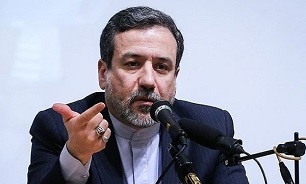Iran Blasts "Biased" US Allegations on Supply of Missiles to Yemen, Stresses Continued Regional Policies
 "I think that the biased nature of these allegations and the method for regulating expert reports of the Commission of Inquiry on Yemen and the UN Security Council is fully clear," Araqchi told reporters on the sidelines of a forum in Tehran on Tuesday.
"I think that the biased nature of these allegations and the method for regulating expert reports of the Commission of Inquiry on Yemen and the UN Security Council is fully clear," Araqchi told reporters on the sidelines of a forum in Tehran on Tuesday.
He expressed pleasure that the US failed to approve an anti-Iran resolution at the UN Security Council which deplored Tehran for alleged supply of missiles to Yemen, and said, "The US administration has several times in the past year attempted to raise Iran's name at the UN Security Council under the pretexts of missile tests, internal riots or Yemen issue which shows the US isolation in the region."
"We will continue our policies in the region and what meets the governments' interests," Araqchi underscored.
His remarks came after Russia vetoed a United Nations Security Council resolution based on a UN report condemning Iran for what it called as violating an arms embargo by sending weapons to Yemen.
Backed by the United States and France, the British-drafted resolution was supported with 11 votes in favor on Monday, before Russia used its veto and other member states abstained from voting.
The US had repeatedly called for the imposition of a renewed embargo on Iran, claiming it was sending Iranian manufactured missiles to Yemen.
It also claimed that these missiles were used to launch an attack on neighboring Saudi Arabia - which along with several Sunni Arab countries – has launched a war against its poor neighbor since 2015.
The Iranian foreign ministry had on Monday dismissed allegations of missile shipment to Yemen, blasting Britain for its "dishonest" behavior by sponsoring a resolution to the UN Security Council against Tehran instead of finding a solution to end the Saudi-led war.
"We don’t send weapons to Yemen. Such allegations and attempts are made to project the blame on others by those who want to use the existing situation against Iran," Foreign Ministry Spokesman Bahram Qassemi told reporters in Tehran.
"We are witnessing a dishonest behavior from the British government that uses the international mechanisms to defend the aggressor despite its slogans about a peaceful settlement of the Yemen crisis," he added.
Qassemi underlined that Iran wants an end to the Saudi-led aggression against Yemen, and said such resolutions are no help to the situation in the poor Arab country.
"Whatever happens in Yemen is the result of exports of British and American arms," he added.
At least 15,700 people have been killed since the onset of Saudi Arabia’s military campaign against Yemen in 2015. Much of the country's infrastructure, including hospitals, schools and factories, has been reduced to rubble due to the war.
The Saudi-led war has also triggered a deadly cholera epidemic across Yemen.
According to the World Health Organization’s latest tally, the cholera outbreak has killed 2,167 people since the end of April 2017 and is suspected to have infected 841,906.
